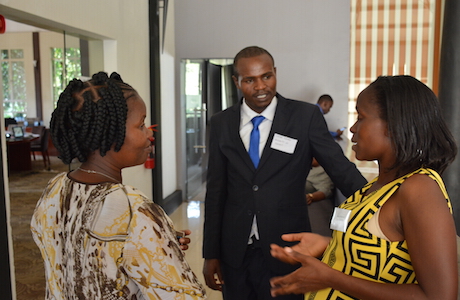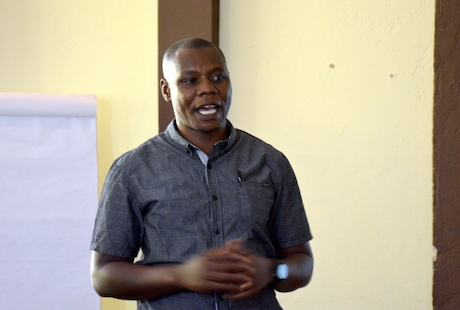Large swathes of the Horn of Africa are currently in the midst of a drought, and around 15 million people are facing food and water shortages. It is a humanitarian crisis with no signs of improving during 2017. According to the Kenyan government, a season of poor “long rains” has left more than 1.3 million people needing food relief in Kenya alone.
While climate change makes unpredictable weather even more likely in the future, African and international agricultural science has many solutions to offer. However, all too often, national policy and practice do not build on scientific insights – for example, agricultural subsidy structures, extension services, infrastructure and market access interventions fail to support more sustainable, resilient modes of agriculture.
The question is how to bridge that gap: How can science support smallholder farmers and help to ensure improved food security in the years to come? How can we make sure that sustainable agricultural intensification and inclusive development in Africa are propelled by evidence-based decision-making, and best available science? How can scientists, policy-makers and practitioners, each coming to the issue with different interests and values, understand each other better?
AgriFoSe2030 forum explores how to give scientists a stronger voice
A workshop in Nairobi at the end of January brought together agricultural scientists from around sub-Saharan Africa, along with policy-makers, representatives of agri-businesses, grassroots organizations and policy studies networks. The workshop was organized by the AgriFoSe2030 (Agriculture for Food Security) programme, funded by the Swedish International Development Cooperation Agency (Sida).
 Coffee break during the workshop. Photo: Anneli Sundin.
Coffee break during the workshop. Photo: Anneli Sundin.
At the workshop, African agricultural scientists and others shared the latest insights from science and practice in the sector around the region. Discussions also identified knowledge gaps and key challenges facing African policy-makers and practitioners today, and how science can help. There was a strong focus on stimulating dialogue among the participants from different countries and sectors.
Jacqueline Kariithi is a scientist at Kenyatta University, Kenya, who has been looking into sustainable tourism practices in smallholder farming landscapes in Kenya’s Mt Elgon region, an area that is suffering environmental degradation due to divergent, uncontrolled and conflicting land uses. “There was huge emphasis on our role in pushing our agenda at the science-policy interface,” she said. “My take-home message is clear: to seek out policy-makers as often as I can and throughout my research cycle.”
Jacqueline and others stressed the important role universities can play in incentivizing scientists to engage with policy-makers and practitioners. The workshop heard that in Zimbabwe, promotion criteria for academic careers include policy/practitioner engagement and active communication of scientific findings. Dissatisfaction with a package of academic promotion criteria recently adopted by the Kenyan government was identified as an opportunity to lobby for a similar approach.
Nuhu Hatibu, CEO of Kilimo Trust (an independent organization based in Tanzania that spearheads market-driven solutions for agricultural development across the East African region) pointed out the importance of engaging with the private sector: “We also need to be able to influence business policies and business strategies, because they have implications of what can be done in terms of smallholder agriculture.”
 Philip Osano, research fellow at SEI Africa, presents work on agricultural policy in Kenya. Photo: Anneli Sundin.
Philip Osano, research fellow at SEI Africa, presents work on agricultural policy in Kenya. Photo: Anneli Sundin.
Informed decisions – from dialogue to action
Ivar Virgin, senior research fellow at the Stockholm Environment Institute and one of the facilitators, was pleased with the outcome of the workshop. “We were able to identify a number of actions and steps that can make the links stronger between science and policy in the agricultural and food security field,” he said. “The participants shared a lot of useful, practical ideas and tips on how science can become more understandable and accessible for policy-makers, the private sector and others working with farmers on the ground. We also discussed possible forums and mechanisms for collaboration between scientists and other stakeholders.”
Ideas for how other stakeholders can support the links between science and policy/practice also emerged during the workshop. For example, it was suggested that media should take care to time science reporting in order to reach the right audiences. Another idea was to create a science journalism competition in combination with a travel fund for journalists to cover agriculture issues in the field. The role of donors was also frequently discussed, and it was suggested that they should require research proposals to include communication and engagement plans and provide guidance on best practice and budgeting, in order to encourage more effective science communication.
These ideas and many more will be gathered in a workshop communiqué soon available on the AgriFoSe2030 website.
“We noticed there was a strong urge for exchanging ideas and wanting to continue the dialogue beyond the workshop. We need to think of ways that AgriFoSe2030 can support and strengthen the networks that were built here,” said Virgin.
AgriFoSe2030 plans to hold a similar workshop in Southeast Asia in early 2018.